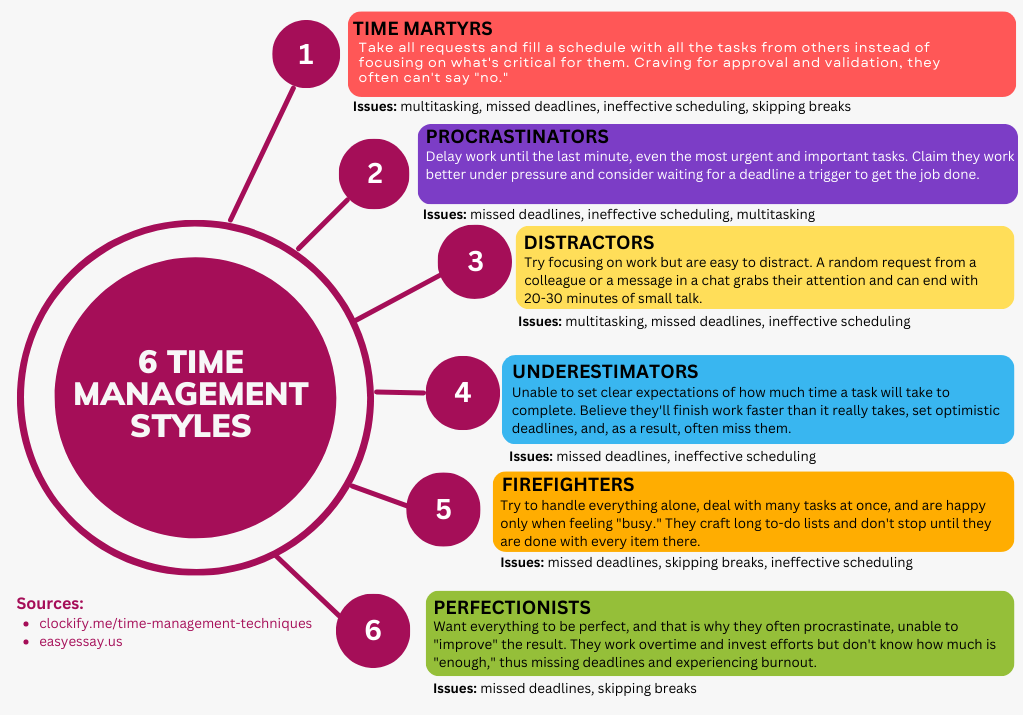Time management strategies are rules and principles you follow to be more productive and efficient, make faster decisions, and accomplish more in less effort and time.
Time management strategies are many, and most articles continue describing the same over and over again: Pomodoro, task delegating, to-do lists, avoiding distractions, etc. — been there, done that.
“Why not be more specific?” we thought and decided to gather tips on time management for creative writers.
Indeed:
It’s one thing to keep a clear schedule when dealing with technical tasks or those possible to automate and foresee the completion time; creative work is a different thing, requiring extra flexibility and focus to balance everything.
What time management struggles do writers face? What are their issues depending on the time management style they have? Which time management strategies may work for people whose daily tasks require imagination, idea generation, creative thinking, and constant motivation to continue?
Here go the answers.
Time Management Skills We All Need to Be Productive
Most time management strategies draw on the same practices:
- Write down what you need to do.
- Prioritize and do urgent tasks first; save time for routine tasks and breaks.
- Track progress, identify lags, and manage accordingly.
It’s all about choices: You decide what you need to reach a goal, when you need it to be done, and how you choose it to be done for better results.
But:
For these choices to appear correct and work in your favor, you make them based on a set of skills. This bunch of abilities is a must for stellar time management and productivity.
- Self-awareness: Knowing who you are and what you want helps with goal-setting and choosing instruments for those goals achievement.
- Stress management: It allows you to understand when it’s better to prevent a problem than later spend time dealing with it.
- Communication: You need this skill for building relations, explaining the necessity of performing a task, and delegating some tasks when appropriate.
- Decision-making: If you can’t make decisions, you won’t understand the time and resources necessary for success.
- Goal-setting: Clear goals make solutions faster to come.
- Focus: This skill is about ignoring distractions and concentrating on significant tasks to complete.
- Organization: It helps you make the right decisions and understand when to start for them to bring the most results.
- Prioritization: This ability helps manage time wiser.
- Planning: Critical for understanding how much time you’ll spend on a task and how to organize your day or week accordingly.
- Patience: This ability to work with no rush is about time management, either. Sometimes it’s worth spending more time on a task than revising it after doing it on-the-fly.
All of them help you understand your time management style with all issues it brings (more on that below) and decide on time management techniques for work that will help manage your particular struggles and be efficient in your case.
Top 5 Time Management Struggles for Writers
Why is it often so challenging for writers to manage time?
Spoiler: It’s not because of their creative nature some people use as an excuse for their procrastination and inability to meet deadlines. (Let’s face it, we all heard those stereotypes about creatives being messy, undisciplined, and only working when inspiration comes.)
Due to the nature of their work, writers struggle with a few obstacles when trying to manage their time more effectively. These obstacles are five:
- Multitasking: Often, a writer, especially a freelancer, works on multiple projects simultaneously.
- Balance: A writer needs to meet writing deadlines and, at the same time, manage the organizational work and communication with existing and new clients.
- Focus: It’s hard to switch from text to text or project to project without distractions.
- Flexibility: A writer needs to be loose enough to deal with unforeseen circumstances yet maintain the work structure and balance to meet deadlines.
- Expectations: It’s hard to predict how much time one text may take to complete or how many words you’ll write in a day, given that the writing process takes much more than writing itself. A writer needs time for idea generation, topic planning, research, outline creation, writing the first draft, proofreading and editing, revising according to the editor’s (client’s) notes, etc.
It’s critical to consider all these obstacles for stellar time management and choose techniques that suit your time management style.
What Is Your Time Management Style?
A time management style is a prevailing method of dealing with work.
Depending on it, some time management strategies won’t work for one person but come in handy for others. When you know your style and all the issues it brings, you’ll understand which techniques will help organize your work.
Time management styles are six. See below and try to find yourself:

7 Time Management Techniques for Creative Writers
And now, to time management in writing:
We know that you’ll find dozens of universal strategies, tips, and techniques on time management online, so we did our best to focus on those suiting creative writers in particular.
So, here they are, 7 strategies of time management for creative writers.
1 – Organize a Writing Area
We’ve heard that thousands of times already: Everything a writer needs for work is a laptop with internet access. Ah, all those inspiring stories about writing on the beach or freelancing in a bed with a cup of coffee and a cat at hand!
Sure, you can do that. But it has nothing to do with time management.
For productive and high-quality work, you need a writing area. It’s a place specifically designed for work, the one you’ll use for nothing but writing. Even if it’s a small corner in your room, do your best to organize it as a workspace:
- Put a table.
- Ensure good lighting: Daylight is best (if possible, place the table close to a window), but a desk lamp with color temperatures around 3500-4000K will also work. Such temperatures stimulate the brain and can influence your productivity.
- Have an ergonomic, comfortable chair to support your back.
- Put a plant: Not only will it clean the air and destress you, but it will also increase your productivity and boost creativity.
- Add a pinch of inspiration. Think of what inspires you and makes you feel positive emotions: motivational quotes, pictures of your family, beautiful views of seas or mountains, books, etc. Decorate your writing area accordingly.






More beautiful workspace styles here
Why have a writing area for better time management?
It’s a signal to your brain: When I sit here, I work! It’s a psychological trick that helps you focus on work, avoid distractions, control time, and stick to your working plan.
2 – Plan Everything and Stick to That Plan
Yes, we know: Sometimes it’s hard to plan writing because you can’t automate the process and count how long it will take to complete a particular writing project. Some write an article for 3-4 hours, while others need 2-3 days to complete a draft. (After all, you have to consider many related factors: the complexity of the topic, the need for prior research, collecting the necessary information for the article, etc.)
But:
You need to plan every step and stick to it. Planning will help you organize the whole process even when you can’t tell in advance how many hours you will spend on the task.
The trick is to have to-do lists for a month, a week, and a day where you’ll break tasks into small, manageable sub-tasks.
- Bad: “Write a blog post for EasyEssay by the end of February.”
- Good: Feb 20-25: Blog post “7 Time Management Strategies for Creative Writers.” Feb 20, 10am-12am: topic research, references, outline. Feb 21, 2pm-6pm: draft writing. Feb 23, 2pm-6pm: draft writing. Feb 24, 10am-1pm: proofreading, editing.
How to plan:
10-12 minutes invested in planning your day will save at least 2 hours of wasted time and effort throughout the day.
Source
Make a to-do list at the end of each day when you see where to resume the following day.
Start a day identifying MITs (most important tasks) and completing them first. (Even if you don’t accomplish everything from your to-do list for that day, the most critical work will be done.)
Set a deadline for every sub-task in your list: It will help focus and motivate you to finish on time.
If no deadline is set, there may not be a direct incentive for you to complete a task until a certain moment in time, which usually means that it takes longer than it should. A deadline can push you to finish on time, even if it may require giving up the time spent on less important activities. - Indeed
Proper planning is about goal-setting, prioritization, confidence, and enhanced creativity — all necessary for stellar time management.
3 – Prepare Topics and Outlines Beforehand
That’s how most non-writers imagine the process:
You sit at a monitor, see the title of a story (blog post, article, you name it), and just start typing it. Word by word. Like this:

The ugly truth of life:
First, you create a content plan, deciding on the topics that will be interesting to the audience and relevant to your content strategy. For that, you research the market:
- Examine what others have written on those topics
- Check if your target audience wants this content from you
- Decide on its keywords, format, and presentation angle
Second, you create a list of topics that might (potentially!) work.
Third, you search for references and create an outline for each topic.
And finally, you sit in front of a monitor, see the outline and references, and start writing a draft. You build a text block by block. Word by word.
The point:
Topic research, content planning, and outlining take a huge amount of time! To organize it for more efficient work and better productivity, make it a separate task in your to-do list: Prepare topics and outlines in advance to save time while writing.
4 – Forget About Inspiration to Come
This one is short yet clear:
Writing is not about inspiration but discipline.
You will never finish that book, short story, or blog post if you sit and wait for inspiration.
Time management in writing can’t coexist with waiting for a muse or a mood to come. Bestselling writers like Stephen King agree: They develop a writing discipline because writing is also a work for them, not just an art.
Writing web texts for clients, you can’t rely on inspiration, either: “I had no mood for writing today” will hardly work as an excuse for missing deadlines.
5 – Find Your Perfect Writing Time
Have you ever heard of a golden hour?
The term comes from photography and filming: It’s the final hour of a day when the light looks soft, making people look beautiful on camera, so it’s high time to get a perfect shot.
In writing, a golden hour is a time when you feel most creative and productive to do your best work. It’s two or three hours when you are the most focused and energized. Often, it’s somewhere around:
- 4am-7am, for early birds who wake up before sunrise and start working while others still sleep.
- 11am-2pm, for afternoon athletes who need some time to finish a morning routine before jumping into action.
- 11pm-2am, for night owls who find it more comfortable to work in silence when others get asleep.
Your golden hour depends on your circadian rhythms. When do you feel more productive: mornings or evenings? Once you identify your golden hour, plan your working day accordingly:
Do the most challenging or creative writing tasks during that time.
6 – Shut Up Your Inner Critic While Writing
The simple yet so often-ignored rule of productive writing:
When you are writing, write!
Nothing special, but most creative writers forget about it: They doubt which word to use, how to start a passage, or whether their skills are enough to engage a reader. They recheck every sentence while writing.
Their inner critic whispers from behind a shoulder that their draft is a sh*t, the writing style is lame, and the overall storyline is boring. They want their texts to be perfect, and they re-write and edit them during the writing process to polish them to shine.
If you are such a writer, then stop doing that!
Perfectionism and impostor syndrome are your two most evil enemies here. When writing a draft, do not focus on how you write: You’ll have time to revise it later. Writing and editing are two tasks, so you can’t do them simultaneously if you crave better time management: Multitasking doesn’t work.
For better time management, concentrate and maintain focus on one task. It will help you get “in the zone,” aka “flow state of mind,” when you feel accomplished and happy with what you do, thus doing it faster.
Speaking of editing, by the way:
Forget about perfectionism here. You can edit your draft endlessly (there will always be something to improve), but you also have other tasks on your to-do list, haven’t you? Learn to see when the draft is “good enough” to stop polishing it and move on to other texts.
7 – Use Procrastination to Your Benefit
While most consider procrastination bad, blaming themselves for it and trying numerous techniques to beat it, creative people can use this monster to their benefit.
How can your procrastination help you manage time and be more productive?
Use it for:
- Generating new writing ideas: When you feel stuck and unable to write, spend that time brainstorming fresh topics for your future texts.
- Advancing your existing ideas: Don’t hurry up to approve the very first writing idea coming to your mind; procrastinate a bit to follow up on it, see its pros and cons, and understand how to enhance it for better results.
- Destressing: You know that you need breaks to stay productive, right? Twenty minutes of procrastination after 90 minutes of working will help you destress, recharge, and continue writing with a fresh eye.
Ready to Audit Your Time Management Strategies?
Now that you have so much information in your pocket, why not stop for a moment and check your writing schedule? How do you organize and use your working time? Do your time management strategies work for you?
Once you understand your time management style with all the issues it brings to your self-organization skills, you’ll know which time management strategies will work for you.
Add them to your toolkit, hire help when necessary, and remember to reward yourself for getting the job done. It’s another trick to “cheat” the brain and enhance productivity: Anticipation of reward will encourage you to work faster to get it.

Your post emphasizes the importance of time management. I read tons of corresponding articles with tips on how to organize time, but yours surprised me with the angle you choose – to focus on writers 🙂 The examples of workspaces you provided are really stylish and inspiring! I think I need to try something like that in my apartment.
Thank you for sharing. I worried that I lacked creative ideas, and your article made me full of hope. Cheers!
This article has revealed a few new time management techniques to try! Thanks!
Given the speed you use working on this blog’s content, I have no doubts it will become well-known soon! Thank you for sharing such comprehensive articles!